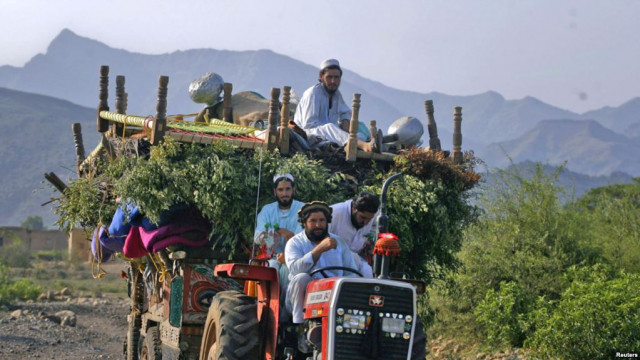Tribalism in Pakistan
Tribal solidarity looks at everything foreign with suspicion

Tribals. PHOTO: REUTERS
Tribalism as a social system can be defined as an arrangement where people are organised into various tribes, sub-tribes and clans and the members of these tribal social tiers are closely knit and have a strong sense of cohesion and allegiance to the tribe, its normative framework and values. Moreover, a tribal society also has a very elaborate intra- and inter-tribal social networking resulting in sturdy tribal solidarity. This tribal solidarity looks at everything foreign with suspicion and hence calls upon its members for limiting social contact with outsiders. Resultantly, there remains a status quo in a tribal society which makes social change extremely difficult to trigger.
Today societies everywhere are undergoing great transformation with values of modernity and postmodernism diffusing and permeating nations, cultures and communities all over the world through the process of globalisation, development, extensive employing of computer, satellite, information and communication technologies. In such a situation, it is very difficult for any society to evade change. However, the peculiarity of tribal society in Pakistan is that it has been able to limit the social contact of majority of people with outside societies and the world. Unfortunately, the Pakistani society’s tribal character and culture have had great impact on the people in more or less negative ways. Surely, one is talking in the context of exporting and infusing violent behaviours and intolerance in members of relatively civilised social structures both within the country and beyond.
The social conditions prevailing in Pakistani tribalism-dominated society in recent decades have had provided an environment to clerical radicalism of the Taliban, Arab fundamentalism of al Qaeda and Indianised Muslim culture to come and thrive. Pakistani state and society have paid a heavy price to be in this situation. This happened because an important aspect of Pakistani society is the prevalence of strong ‘religious’ sentiments. This is very much akin to every tribal society where superstitious, conservative and narrow interpretation of religion is a norm.
The radical Arab influence in Pakistan, directly through emergence and presence of al Qaeda in Pakistan and indirectly through a large number of Pakistani workers in Gulf-Arab countries, reinforced the tribal structures in Pakistan. At the same time under the impact of Arabism Pakistani society’s tribal character has experienced important changes. For instance, the traditional tribal values of respect, altruism and an important standard of behaviour during conflicts of desisting from killing civilians or non-combatants, have vanished into thin air.
Tribalism in medieval times had a value to organise people in communities to facilitate their lives but it does not have any appeal for a civilised and enlightened community. The fundamental problem with a tribal society is that the decisions are taken collectively where the agreement of all or majority members of a tribe or a clan is not necessarily required. Rather the tribal chieftains or a coterie of influential persons make decisions and take actions on behalf of the tribe. Through this mechanism, the affairs of tribes have been managed since time immemorial. The negative aspect of this has been that every tribal individual has to suffer due to decisions taken by the tribal coterie.
In short, it is the apolitical, highly collectivistic and superstition-laced social structure of Pakistan which is extensively responsible for extremism and terrorism, large-scale underdevelopment and bad governance in Pakistan. Now after establishing that the tribal structure is part of the problem, the most pertinent question is how to transform it so that the process of development, which itself means a social change in the desired direction, could be initiated there.
Published in The Express Tribune, March 11th, 2018.
Like Opinion & Editorial on Facebook, follow @ETOpEd on Twitter to receive all updates on all our daily pieces.















COMMENTS
Comments are moderated and generally will be posted if they are on-topic and not abusive.
For more information, please see our Comments FAQ